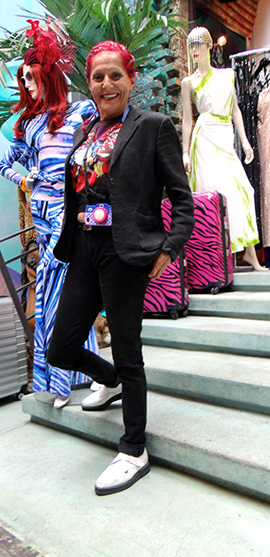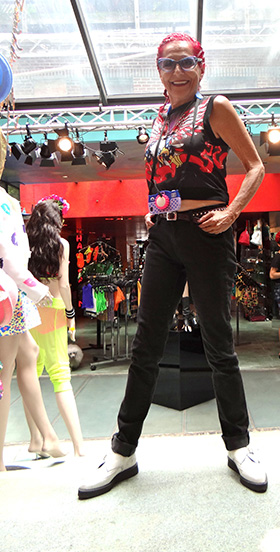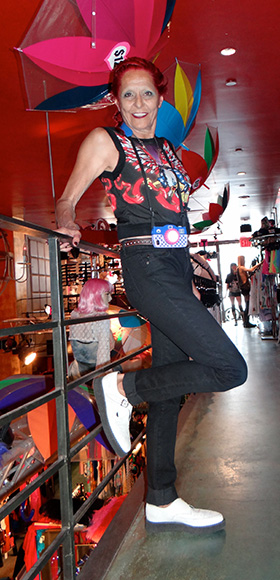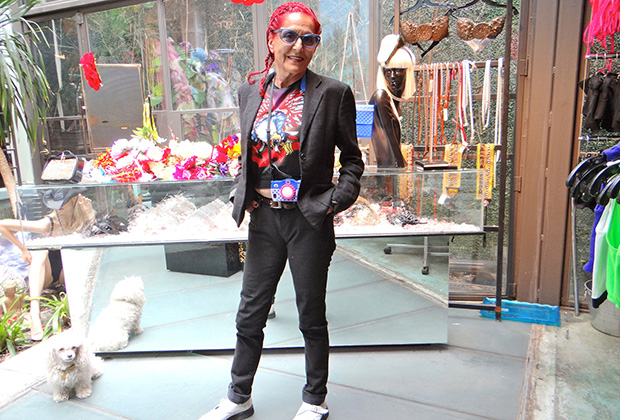Greek-American Style Icon Patricia Field: “Don’t look at magazines for what to dress”
Greek-American style icon Patricia Field sat down with Neo Magazine to discuss her heritage, accomplishments and ties to Greece. The winner of two Emmy Awards, five Costume Designers Guild Awards and a Satellite Award for Costume Design for Sex and the City, Ugly Betty, Mother Goose Rock ‘n’ Rhyme and The Devil Wears Prada, Field has forever changed the international platform of TV fashion and glamour. Her Manhattan boutique and clothing line coined Patricia Field, define urban style sophistication. Field’s electrifying personality, individualism, humbleness and self-confidence shine through in our interview.

Patricia Field
Where are you from in Greece?
I am from New York City. I was born here in New York City, my parents were born in Europe. My mother; she was born in Lesvos. My dad was born in Constantinople (Istanbul). My dad was Armenian; my mother Greek. They met in New York. They worked in the same place. They met, they fell in love, they got married and I was born in New York Hospital.
How much of an influence was your heritage while growing up in Astoria, Queens? Can you tell us a bit about your upbringing?
Well I grew up part time in Astoria because my yiayia lived there; all of my aunts and my family. But when my mom and dad got married they moved to Manhattan. I as a little girl, would take a taxi and go and take myself to Astoria to my grandma’s. My Greek heritage was very strongly given to me through my grandmother, who was a very educated woman. I think at the point that she was in Lesvos the generation had declined. But her husband, my grandfather, had come to America when he was a boy and worked for about ten years here and he went back as an American citizen, had money, opened up businesses. He snagged my grandmother.

Patricia Field – “I only wanted my own business. I did not want to work for anybody. I’m not that kind of personality. I wanted my own business and that’s what I geared myself to do. I graduated college young because I was in a hurry to get through it.”
Here’s a good one about them: Ok, my grandmother’s maiden name was Valakou, you know that famous actress, she was back then, back then meaning the ’20’s, ’30’s. So my great-grandfather, my grandmother’s father, left his wife and moved to Athens with Valakou. She was a big actress over there. Anyway, my grandmother married my grandfather and they had ten kids over there and they were all American citizens through my grandfather’s citizenship. So when it came time for the oldest to go into the army, my grandfather was like, he is an American citizen. They said well if he is an American citizen, go to America. So I think they got deported.
My grandfather was stubborn and he left. And he brought the whole family and they came to Astoria. So that’s how we got back to Astoria. And I would always go to my grandma’s. I used to sleep there. My parents had just started a business, you know, they didn’t have money to hire a nanny, thank God. I had my grandmother, my yiayia Sultana. My yiayia was very educated; information galore. I was very, very fortunate and that’s where I learned to speak Greek. And then through my life I tried to keep it or improve it. I like it. I like that I can speak it. I can’t speak it very well but I can speak it OK. Actually in Greece I did a couple interviews in Greek on TV.
How often do you get to visit our homeland?
I get there often, more often than, you know what, more than 10 years ago I met Fotis Sergoulopoulos. I met him here in New York at a dinner party through friends and we just hit it off immediately. And then I started going to Greece, to go see him and he would come here. So the back and forth really made a big rapid increase. And at this point in general I get there at least three times a year. I was just there for Easter; we went down to Kalamata. I had never been there before.
The Greeks are huge fans of yours. When did you become recognized so largely over there?
You know, I don’t know. I think it kind of built. I think to start off with, Fotis had a big influence because I went on his show a few times. Also Anna Vissi. I was at a concert here. I was a fan of Anna’s. So I went with a friend of mine to the concert and I went to Astoria and got this big oversize white t-shirt with a blue print of Anna. And then I went in New York and bought an “I Love New York” t-shirt. And I took those t-shirts and made little skinny dresses out of them. And I wore the Anna Vissi dress and I threw the “I Love New York” on the stage at her and that’s how we became friends. And because I was going to Greece you know, we continued seeing one another.
So I think between Anna and Fotis, I think they helped me to be more out there in the Greek audience. And once it started catching, I started getting requests from Greece and people knew about me. For many years I didn’t really publicize I was Greek. But at one point and I can’t remember what the reason was, at one point I decided ok now I’m going to let everyone know I am Greek. I don’t know why. Something hit me. Once people started knowing I was Greek, all these things converged. I am very happy people like me in Greece. I am very, very happy, it’s wonderful. What could you say, when people like you, that’s the best thing you can be.

Patricia Field – “Know who you are. Take some time out for yourself. Express yourself and what you feel. That is called individual style. That is the opposite of fashion victim.”
You designed Anna Vissi’s wardrobe for “Stin Pira’s” & “Alitissa Psihi’s” music videos and her “Fabulous Show”. Where did you draw inspiration from?
It was fun. I had fun doing the videos and show. I think that was a really strong time for her. She blew it up.
You recently showcased your line at Athens Fashion Week. How was that experience? What preparation did you have to do to get in there?
I had a lot of preparation getting all that stuff over there. And really I don’t have a collection as a designer every season. I just do things in my store. I work with a designer very closely so he creates a lot of our label collection-type pieces. When the Greeks asked me, I said alright, let me try to do this. I had to style and organize everything and then drag it over there. And then they had this idea, a pop shop, which added a whole other dimension. We had to set up a little pop shop and bring the merchandise. It was complicated; to get it in there and out of there. But it got done and I think people liked it.
I think one of the big things I know they loved was the music by DJ Matteos. He mixes rebetiko and rap. Those two things go together because they are both soul and music of the outcasts. He knows his Greek music and he knows his urban music because he is Greek-American. But he lived in Greece for about 6 years when he was a kid. He has got it down.
Is you line available in other countries?
Right now I have a few items that are hot on fire that we export to Korea, Japan, China, Hong Kong, London, and Paris. I don’t go out there selling our stuff. If we sell anything it’s because people contact us and they want to buy something that we have. If we make it and sell it, we do. But we don’t really formally wholesale. It’s whoever comes after us; we see if we can do some business.
Can you tell us how you selected the names Sultana and Putana for your pet poodles and Cariola for your cat?
Of course my yiayia’s name was Sultana. I always have to have a Sultana in my life. And she was one of the most important people in my life. And when she died I missed her and I continue to miss her all the time. My memories of her are just so great and just to hear her name is what I wanted. Once I had a myna-bird, I named the myna-bird Sultana. I got these two sisters from the same litter, I got them together. My first idea is I am going to name one Sultana and one Putana because they won’t know the difference and whenever I say Sultana or Putana they will both come running.
To me, Sultana is like the Sultanist, the queen, and the opposite was Putana, because her personality is much more “hold me” and Sultana is much more like a dog. Putana is more like a baby. So in the end the names worked out pretty good. The cat came along soon after and I thought alright, Sultana, Putana …Cariola. They are about 9 now. Putana’s nickname is Puti, Cariola’s nickname is Carrie but Sultana’s remains Sultana.
How often are you at your store?
Sometimes I’m here often, sometimes not as often. It just depends on how much time with outside projects my life takes. I’m trying to control the outside projects to short ones. These days I’m here and since I expanded I think it is very important that I’m here more and that I’m more active.
What do you think of Greek fashion?
I think more about Greek food. Greek food has a huge future in the American market because here people know that Greek food is healthy food. For example, FAGE Total. They were flying that stuff in from Greece, they couldn’t get it in here fast enough. You could only get it in gourmet stores. They built a factory not far from here. Now you can get it everywhere. The people want it. They know it’s healthy. My idea is about Greek food. Greece needs to produce and sell to others. Greece has a big advantage when it comes to food.
What’s your favorite place to go in Greece to get away from it all?
That’s a hard one. I have been to many islands and I enjoy them. But I get away from it all when I go to Athens. I love Athens. In twenty minutes you are at the sea; the most beautiful swimming. I love it over there. I would just have to say Athens. There is nightlife over there and it’s Greek. It’s not like Mykonos. I don’t go to Greece to do what I do here in New York City.

Patricia Field
What prompted you to offer the Greek beauty line Apivita in your boutique? Is it successful here in America?
I love the Apivita brand, right now Queen Bee is on my face. They make the absolute best products. You put those products to your body and you feel it immediately. We use the shampoos in my beauty salon and the costumers ask-what is that, that smells so gorgeous. Apivita wants to be in America. I carry it as much as I can. I’m not a beauty store I am a clothing store. It’s kind of a side line just because I like it. In Greece it’s in every pharmacy. I love it.
Can you us about opening your first store at the ambitious age of 24.
I was brought up in business. In my family were all entrepreneurs, including my mother and my grandfather and everybody in between. So I grew up in that atmosphere so it came natural to me. When I was a kid I worked in my mother’s dry cleaning business as a sub in for all the different people on vacation in the different stores. I would go and run the stores. I went to NYU and studied liberal arts. I enjoyed it but when I graduated I didn’t want an office job.
Fashion always came to me easy. I didn’t even have a consciousness that it was easy. I just knew I wanted my own business, that’s what I knew. So I saw an ad in the paper: “College Grad Management Trainee” in a department store. I took the job; I learned the retail and fashion business. And then after three years I opened up my own business. I only wanted my own business. I didn’t want to work for anybody. I’m not that kind of personality. I wanted my own business and that’s what I geared myself to do. I graduated college young because I was in a hurry to get through it.
Your legendary Patricia Field boutique in New York City’s East Village expanded last June. What factors contributed to this enlargement?
My boutique was right on this block, two doors away. I had bought this property in the year 2000. I moved into it and I lived here. And two years ago, right behind my property, where we are sitting now, it came for sale. I thought this property borders my property, I have to buy this. So I bought it and then I put my store now in both of my properties and moved out my residence. I feel much more secure because I own the property that my business is on. I don’t have to deal with landlords increasing my rent. That’s what prompted me. The opportunity came and I ate it.
If you gave only one piece of fashion advice to someone, what would it be?
It would be…there is an easy one and a hard one. The easy one is make sure your clothes fit. That’s half the battle. Don’t wear them too tight. But the real good one is, know who you are. Take some time out for yourself. Express yourself and what you feel. That is called individual style. That is the opposite of fashion victim. Express yourself. It’s a communicative art, you want to communicate to the world out there. The first thing you do is you meet a person and they see you and they hear you. So carve out your style, it’s yours. It doesn’t belong to anyone else. You just have to understand that it’s yours. And you can do it. Don’t look at magazines for what to dress.
What are your favorite essentials to include in every outfit?
My philosophy is that all people are different. People have different needs, they have different bodies, they have different worlds. The same thing does not apply to all. For me an essential is a tweezer. I was always a jeans girl, I loved jeans when I was five. Everyone is not the same. I think the answer lies in knowing who you are and going from there.
What’s your favorite color? Print?
Personally green. I feel the most comfortable surrounded in greens. In the end I wound up with red hair because it is the most complimentary on my olive skin tone. I love animal skin prints. But the problem with that is it gets very trendy and then you have to look the other way for a while. But they always come back, they are classics. I like them more in the natural colorations. I have a lot of animal print in my home. I like camouflage too.
Your boutique carries a variety of Greek inspired items such as a flashy evil eye necklace and Greek name plate necklaces. Have you always incorporated our heritage in your designs?
I didn’t always incorporate them. But now Greek is much more pervasive for me so sometimes I get an inspiration to do something. When I did the fashion show in Greece, my colleague David Dalrymple did some beautiful things. Among them was a sequined chiffon and he painted the sequins with a light blue stain like the flag and made a beautiful gown with it. It was gorgeous. And then he did these white speedos that say “Greek” in the back. Those were a big hit down the runway. I tried to make some special pieces for the show.
You have a magnetic presence and bold personality that exudes a belief in yourself. Were you born this way?
My yiayia taught me. Whatever I did was fabulous so I learned confidence. I never heard a negative word from her. My mother taught me a lot about business and other things as well. But my grandmother really paid a lot of attention to me. I was her favorite so I could do no wrong. If I took my kaka and put it on the walls finger-painting, I was an artist.
Have you always smoked like a Greek?
Yeah. My mother smoked, my father smoked, I smoke. We all smoke. I enjoy it. I believe in living when you’re alive. You can’t live when you’re dead so enjoy yourself.
Ouzo, raki or tsipouro?
Ouzo.

Patricia Field – “My yiayia was very educated; information galore. I was very, very fortunate and that’s where I learned to speak Greek. And then through my life I tried to keep it or improve it. I like it. I like that I can speak it. I can’t speak it very well but I can speak it OK.”
Was there a vast influx of fashionistas from all around the globe that flocked to your boutique after your initial Sex and the City fame?
When I started Sex and the City I was already in business for 30 years and I was already doing film for more than ten years. I’m trying to say that I had established an international fashion following. Fashion people would come from here and there, Europe, Japan. They would always come to my boutique. But of course Sex and the City put it out worldwide to the vast audience. So yes, there was a big elevation of consciousness about my boutique.
I continued to do my boutique the way I always did my boutique. I didn’t turn myself into Sex and the City. My boutique never was and is not going to be. Of course we had an increase in people knowing us and coming on our website. It was all very positive. But as I said, I was Patricia Field before Sex and the City and I have to be Patricia Field after Sex and the City.
What’s next for Patricia Field?
Whatever comes along. I’m the kind that sits at the edge of the seashore and the wave brings in the stuff and I say-what’s here, let me see. I don’t really go aggressively after things that much. I’m more passive that way. Thank God the waves come in and the pebbles come through. So I could get a call this week-can you come to Morocco this weekend, we have a client that wants your consultation and I’m like, sure.
The long term planning, I don’t have patience for. I guess that’s why I love retail because it’s quick. I like the fast movement. Right now I’m consulting on a movie. Nick Cassavetes is the director. That’s the reason I did it because when the producers called me I up, I said I’m retired I’m sorry. And then he called me and he charmed me into it and I like him so much. I have a lot of stuff floating around right now. I get a lot of hits. At the end of the day I always have my shop to come to. It keeps me carefree as long as I take care of it. It’s mine. If you have an opportunity go for it, because you never know where it’s going to lead to.
Anything else you would like to tell your Greek-American audience?
Eat Greek.















0 comments